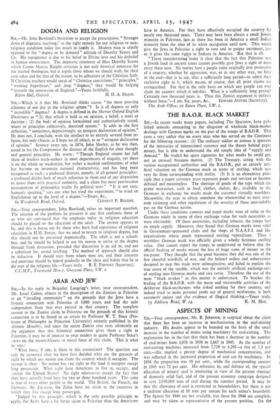SIR,—Which is it that Mr. Rowland thinks causes " the
most pressing dilemma of our day in the religious sphere "? Is it all dogmas or only " incredible " dogmas? A dogma is defined in the Shorter Oxford English Dictionary as "(1) that which is held as an opinion, a belief, a tenet or doctrine ; (2) the body of opinion formulated and authoritatively stated, tenets or principles collectively, doctrinal system." It adds to the first definition, " sometimes, depreciatingly, an arrogant declaration of opinion." He does not, I conclude, wish the intellect to be entirely severed from re- ligion, but only objects, as I hope we all object, to an " arrogant declaration of opinion." Seventy years ago, in 1874, John Morley, as he was then, noted in his On Compromise the distrust of the English for clear thought and general principles. He wrote: " Though England counts her full share of fearless truth-seekers in most departments of enquiry, yet there is on the whole no weakening, but rather a marked confirmation, of what has become an inveterate national characteristic, and has long been recognised as such ; a profound distrust, namely, of all general principles: a profound dislike both of much reference to them and of any disposition to invest them with practical authority, and a silent but most pertinacious measurement of philosophic truths by political tests." " It is not easy, humanly speaking," says one who has tried the experiment, " to wind an Englishman up to the level of a dogma."—Yours, &c.,


































 Previous page
Previous page